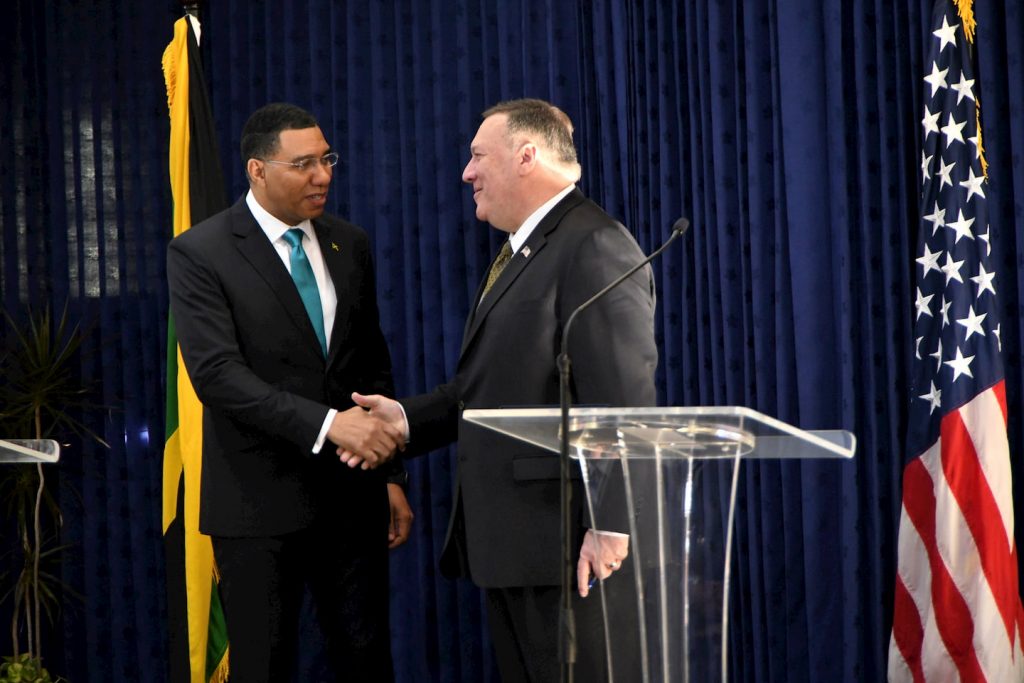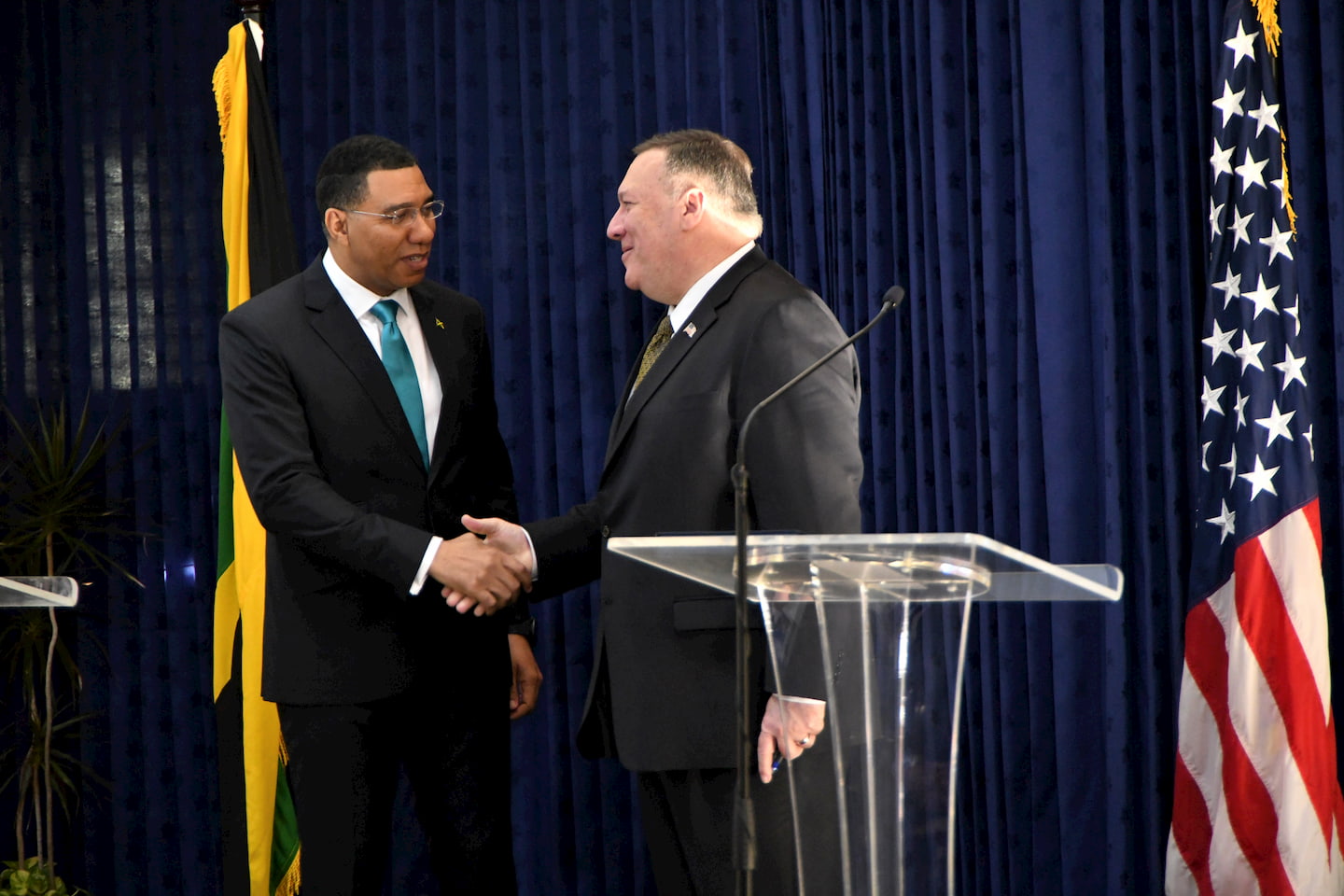China’s rapid economic and geopolitical march through Latin America and the Caribbean (LAC) has been particularly problematic for the United States (US). The countries of the hemisphere are in America’s geographic backyard, and any increase in influence by China, or by any major economic or military global competitor in the region is considered to be a threat to US national security. President Donald Trump’s view of China as a national security threat is in sync with most members of the US Congress. Any divergence between them is in strategy and execution necessary to effectively counter China’s growing economic and geopolitical influences globally and in the region. United States policy towards China is multifaceted and complex. Oftentimes, it is incoherent.

China’s economic footprint can be found in several LAC countries, with China’s geopolitical and economic engagement overshadowing that of the US in many. China’s strategy employs investments in infrastructure development (through loans and other state funding arrangements, as well as direct contracting); direct investments in extractive industries and agriculture, with rapidly expanding investments in energy and communication in a number of countries in the region; and increasing two-way trade between China and countries in the region, especially with countries of South America. While the Trump administration has focused on China’s economic engagement with, and support of Venezuela – a vexing issue for the Trump administration and one that is a major driver of US anti-China engagement in LAC – the Trump administration is steadfast in its opposition to China’s economic and geopolitical engagement everywhere in the hemisphere.
‘Some 20 years ago, I had a conversation in the corridors of the UN Security Council with the then ambassador of China who impressed upon me what he termed as China’s main global objective … China’s interest was in attaining global economic power.’
China’s visibility in LAC makes it easy for US diplomats in host countries to focus on China’s advances in the region. US diplomats drive on Chinese built roads and bridges and pay tolls to Chinese companies; they travel through airports built by Chinese engineers and financed through facilities provided by the Chinese government; they attend sporting events at stadia and arenas built by Chinese engineers, often with Chinese funds. Goods shipped to and from the US and countries of the region are likely to pass through Chinese-built seaports. American diplomats are wary of attending meetings in certain buildings, such as foreign ministries and other government headquarters built by Chinese engineers. China is outpacing the US in offering education and cultural exchange opportunities to countries such as Jamaica and other countries in the Caribbean. China’s trade relationships with countries in the region open new markets for Chinese goods and services and new markets for local and regional exporters to China.
I am not surprised by China’s global economic growth and influence in the region. Some 20 years ago, I had a conversation in the corridors of the UN Security Council with the then ambassador of China who impressed upon me what he termed as China’s main global objective. He was responding to a question I asked about an article in a major American newspaper on China’s increased military spending. He said China’s military spending, which paled in comparison to US military spending, was mischaracterised. The ambassador told me China’s interest was not in projecting military power on a global scale but that its military buildup was for defensive purposes. He emphasised then that China’s interest was in attaining global economic power. China has now achieved that objective, and is using its economic power to develop new geopolitical relationships.
‘China is prepared to confront bumps in the road and challenges to their economic progress, such as the current coronavirus. The Chinese are accustomed to setbacks, but they know how to recover.’
Notably, at the time, there were an estimated 400 million Chinese who spoke fluent English, the standard language for international commerce. English learning was mandatory in China’s high schools. Some years later, in 2009, while participating in the annual Geneva Games as a UN Security Council facilitator at the Geneva Center for Security Policy, a Chinese national told me that China had by then made the teaching of English mandatory at the kindergarten level. Governments of China are known for their decades ahead planning. China is prepared to confront bumps in the road and challenges to their economic progress, such as the current coronavirus. The Chinese are accustomed to setbacks, but they know how to recover.
The Trump administration is losing its economic and geopolitical battle with China in Asia. It’s not about to do the same in its Latin America and Caribbean backyard. It should be no surprise, therefore, the Trump administration’s policy is to reverse China’s geopolitical and economic penetration in the region. The Trump administration warns of what it characterises as China’s “predatory economic practices”. But, it raises a number of questions. With little progress in stopping China in Venezuela, has Jamaica become ground zero for Trump’s geopolitical and economic war with China in the hemisphere? The Trump administration has drawn its anti-China line in the sands of Jamaica. While the Jamaican government has opened the door to the Trump administration, there may be any number of reasons in the policy-making conundrum and shambolic geopolitical policies of the Trump administration. There is no simple answer.
Jamaica’s long-standing relationship with the People’s Republic of China, since the establishment of diplomatic relations between the two governments in November 1972 spanning several decades, grew from a political relationship to strong economic engagement. That relationship is arguably to the advantage of both China and Jamaica. China, now a global economic power, with the intent to penetrate deeply into the US’ ‘backyard’; with Jamaica, lacking in modern infrastructure development, and searching for foreign direct investments, while striving to develop and diversify trade relationships; and with successive Jamaican governments seeking to take advantage of Jamaica’s ‘special’ relationship with China, it only seemed natural that Jamaica would become a place for the Trump administration to make a stand. The stage is set for US-China competing interests in Jamaica. Much depends on how the Jamaican Government responds to this new reality of two global economic powers as suitors.
China has referenced its special political relationship with Jamaica in expanding its economic engagement. In addition, Jamaica’s traditional high profile in the Caribbean and the hemisphere, and traditional leadership in international bodies, such as the G77+China, provided China with a political entrée into the region. Jamaica’s history with China is one of increasing economic and geopolitical engagements with successive Jamaican governments, irrespective of political parties. Previous Jamaican governments acting in Jamaica’s national interests have managed this relationship in a manner to avoid disfavour by successive US governments. In the meantime, the US has maintained and strengthened its economic, political, and security relationships with Jamaica and the region.
With the recent political pressure being put on Jamaica by the Trump administration to reject China’s economic engagement, which is not an option in Jamaica’s national interest, it is yet to be seen whether the current Jamaica Government has the diplomatic sophistication and principled foreign and economic policies to resist US pressure. Indications are that the Jamaican Government appears to be bending to US pressure, and has offered little, if any, resistance to Trump administration’s aggressive ‘America first, take no prisoners’ policies. The Trump administration has interpreted the Jamaican Government’s accommodation of Trump’s hemispheric policies as an opportunity to draw its anti-China line in the sands of Jamaica. Former Jamaican governments would have reacted differently to this challenge, and would have pursued, without fear, the principled and beneficial relationship which has existed for a long time between Jamaica and China.
The Jamaican Government should acquaint the Trump administration of Jamaica’s long-standing principled and beneficial relationship with China spanning nearly five decades.
Since the late David Coore, then deputy prime minister, led Jamaica’s first official delegation to China in 1976, there has been a two-way parade of Chinese and Jamaican government officials between the two countries. Every Jamaican prime minister since Prime Minister Michael Manley’s visit in 1991 to Prime Minister Andrew Holness’ visit in 2019 have made official visits to China (P.J. Patterson – 1998, 2005, Portia Simpson-Miller – 2013, Bruce Golding – 2010). On these visits, they have met with the Chinese president, and with other Chinese high government officials. The same cannot be said for Jamaican leaders meeting with US presidents in Washington. Jamaican Foreign Minister Hugh Shearer led an official Jamaican delegation to China in 1985, and former Leader of the Opposition Edward Seaga visited China in 1996. Chinese leaders, vice presidents, vice premiers, and other high government officials, and business leaders, have reciprocated with visits to Jamaica – the current president of China, Xi Jinping had an official visit to Jamaica when he was vice president of China.
Over these years of official exchanges, dozens of agreements and memoranda covering economic assistance, grants and loans, trade, commerce, construction, cultural, sports and education exchanges, and cooperation between Jamaica and China have been signed by the governments of the two countries. These agreements have inured to the benefit of both countries.
While China plays the diplomatic long-game, the US plays by its own rules in the geopolitics of the day. The Jamaican Government should acquaint the Trump administration of Jamaica’s long-standing principled and beneficial relationship with China spanning nearly five decades. This relationship intensified as China’s global economic power grew. The warnings to Jamaica by the Trump administration – former US Secretary of State and current Secretary Mike Pompeo – of what they characterised as China’s “predatory economic practices”, and highlighting, perhaps lecturing, the Government and people of Jamaica about differences with China on shared core values, political freedoms, and democratic norms demonstrate the Trump administration’s lack of understanding of realpolitik. It insults the intelligence of the Jamaican people.
The Jamaican government by its words and actions must take a principled path. The Holness Government must find a way to erase this US drawn anti-China line in the sands of Jamaica, and find ways to ensure that both China and the US are welcome in Jamaica. They must be persuaded to take their fight elsewhere.
Ambassador Curtis Ward is a former ambassador of Jamaica to the United Nations with responsibility for Security Council affairs. He is the publisher of The Ward Post.
Viewpoints is committed to expanding its range of opinions and commentary. Share your views about this or any of our articles. Email feedback to viewpoints@gleanerjm.com.







